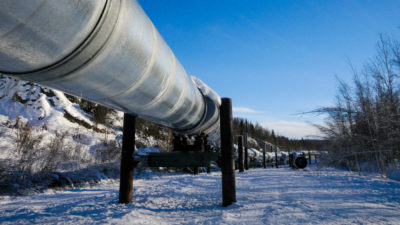Kinder Morgan Inc.’s (NYSE:KMI) Canadian operations continue to be a small drag on its overall earnings. That drag has nothing to do with the fact that its Trans Mountain Expansion project continues to be delayed. Nor does it have anything to do with the weak oil prices we’ve seen over the past few months. Instead, the issue pulling its profits downward is the weak Canadian dollar, which had a noticeable impact on earnings last quarter.
Strong results, weak CAD
In Kinder Morgan’s first-quarter report the company said that its Kinder Morgan Canada segment produced earnings of US$41 million. That was US$7 million less than it produced in the first quarter of 2014. This was despite the fact that demand for capacity on its Trans Mountain pipeline remained high. In fact, that company reported that the throughput was 10% higher compared with the first quarter of last year.
Despite this operational strength the segment’s earnings were a drag on results due entirely to an unfavourable foreign currency exchange rate. This was after the Canadian dollar declined in value by 11% in the first quarter of last year. It’s an issue that continues to plague U.S.-based companies operating in Canada and one that Kinder Morgan sees as being solely responsible for driving lower-than-expected growth from its Canadian segment in 2014.
A competitive advantage for rivals?
The concern for Kinder Morgan investors is that this issue could linger and pose a problem when the company builds its $5.4 billion Trans Mountain Pipeline Expansion. That’s because that expansion project is a U.S. dollar project, meaning it is becoming more expensive due to the delays and a strong U.S. dollar.
It’s an issue that rival Enbridge Inc. (TSX:ENB)(NYSE:ENB) isn’t facing, as it moves closer to building its own westward leading pipeline, Northern Gateway. As a Canadian company, its home currency is the Canadian dollar, so it actually stands to benefit from its weakness because its pipeline project won’t face the same currency inflationary pressures as Kinder Morgan will if this weakness continues. That said, Northern Gateway continues to face stiff opposition, which will continue to delay that project in much the same way it has been delaying the Trans Mountain and other oil sands pipelines.
Still, the other thing to consider here is the fact that these two companies have different views on how to manage this currency risk. Enbridge’s business model is “relatively indifferent to where currency movements take us,” according to CFO John Whelen on Enbridge’s fourth-quarter conference calls, because “we are relatively substantially hedged.” In fact, he went on to point out that the company is 80% hedged in 2015 and 70% over the next few years and it has the flexibility to become even more hedged. Because of that, it isn’t seeing the impact on foreign currency movements to the same degree that these same movements are impacting Kinder Morgan’s operations in Canada.
Investor takeaway
Kinder Morgan’s Canadian subsidiary continues to be a drag due to a weak Canadian dollar and is still having issues getting its Trans Mountain expansion project approved. Those delays could prove costly, as they’ll likely add to the project’s cost because the company might have to shift the pipeline’s route. It’s a risk that rival Enbridge isn’t facing, which could help its project create more value for investors than Kinder Morgan’s project, if it ever gets built.







